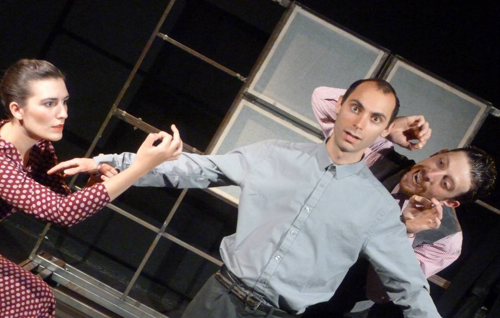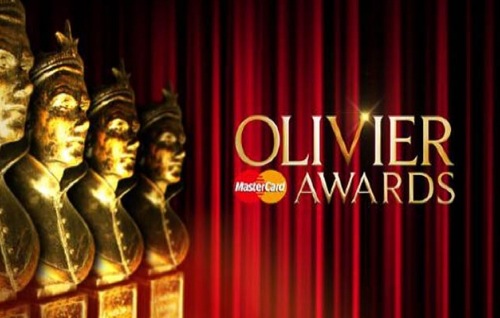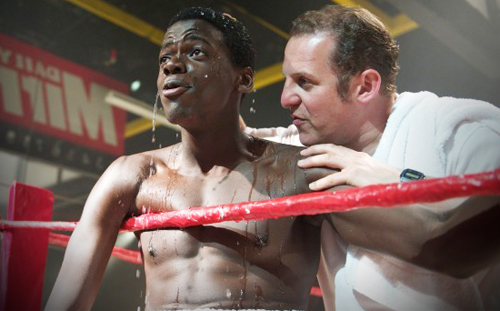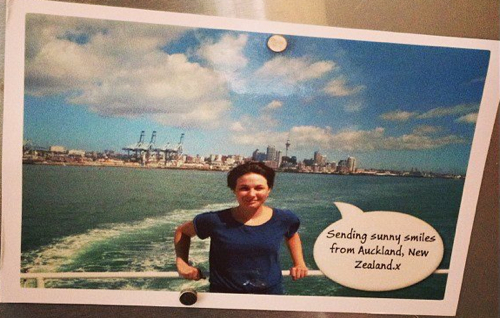
 (Ben Hadley, pictured, left) Over the past few weeks, I have been to see a number of pieces, as well attending talks about various aspects of theatre (many of them part of the Bush theatre’s Radar Festival) which have prompted me to consider the place of hope in theatre, or rather, to think about theatre as an act of optimism. At first I was unsure of whether I should write this under my own name, as a personal reflection, rather than here, as co-director of Le Mot Juste Theatre (which I run with Sophie Horton), but I was persuaded to write in the latter capacity after a talk at the Oval House theatre about the place and nature of “political theatre”, following a performance of Hannah Silva’s Opposition.
(Ben Hadley, pictured, left) Over the past few weeks, I have been to see a number of pieces, as well attending talks about various aspects of theatre (many of them part of the Bush theatre’s Radar Festival) which have prompted me to consider the place of hope in theatre, or rather, to think about theatre as an act of optimism. At first I was unsure of whether I should write this under my own name, as a personal reflection, rather than here, as co-director of Le Mot Juste Theatre (which I run with Sophie Horton), but I was persuaded to write in the latter capacity after a talk at the Oval House theatre about the place and nature of “political theatre”, following a performance of Hannah Silva’s Opposition.
At the very end of the discussion, Chris Goode, who was in the panel, asked the audience if anyone felt angry or frustrated by what had been said. One gentleman raised his hand and said something along the lines of, “yes, there have been a lot of interesting points, but isn’t this all just intellectual masturbation?”, (an accusation which might carry particular weight in this country, where it is bad enough to be an intellectual, let alone one who masturbates). And to an extent, of course, his question was perfectly legitimate. After all, he had just sat through an hour of people talking about how ways of talking about theatre may or may not be adequate for talking about the ways that theatre invites us to talk about theatre. Any group of people who share similar jobs or interests, when gathered together, tend to take pleasure in talking about themselves (journalists are a particularly egregious example). I suppose it’s a form of self-validation, especially when the area in which they work is in crisis. But should this gathering of theatre types, essentially to talk about themselves and what they do, be characterized (and therefore dismissed) as “intellectual masturbation”?
Well, in this case, there were also people who make theatre in the room (indeed there were two of them on the panel – Chris Goode and Andy Field, not to mention the third panellist, Maddy Costa who has shifted her perspective as a writer from being a critic in a fairly traditional sense to observing and documenting the processes of making theatre). It is not only useful, but necessary for theatre makers to be provoked by a critical perspective. Peter Brooke, as quoted by Maddy Costa at a later talk at the Bush theatre, makes this pellucid in his Empty Space:
“Our relations with critics may be strained in a superficial sense, but in a deeper one the relationship is absolutely necessary: like the fish in the ocean, we need one another’s devouring talents to perpetuate the sea bed’s existence. […] The critic is part of the whole and whether he writes his notices fast or slow, short or long, is not really important. Has he an image of how a theatre could be in his community and is he revising this image around each experience he receives? How many critics see their job this way? The more the critic becomes an insider the better.”
Of course, it is not only the critic who must have an image of how theatre could be in his community, but the theatre maker too. (As a side note, it is interesting how Brook evokes an “ecology”, a concept fairly recently re-appropriated by mainstream critical discourse (cf. Lyn Gardner, Andrew Haydon, etc.) and as a not-so-side note, “how a theatre could be” comes back to our theatre as an act of optimism. As always, Brook is prophetic, or rather, timeless). Thus, not only do such forums inform the work of people who write about theatre, but also that of people who make theatre, and while it might sometimes feel like these discussions simply feed into themselves, like a snake eating its own tail, the people in that room in the Oval House were clear evidence to the contrary. Simply speaking for myself and Le Mot Juste: this spring, we will be running workshops in over 15 schools in the South-West of England as part of a tour of our adaptation of The Overcoat, and the work we make will be shaped not only by our imaginations, and in response to the world as we perceive it, but by the considerations of people who write and talk about theatre. As mentioned before, there were plenty of other theatre makers there who will bring their work to different audiences in different ways too.
I suppose all of this is a long-winded way of saying that it makes sense as a theatre maker to talk about theatre from a critical or reflexive standpoint , but I hope it is also a useful preamble to considerations on a “theatre of hope”.
As mentioned above, much of what follows will focus on performances I have attended at the Bush Theatre’s Radar Festival. This is partly because they are foremost in my mind at the moment, but also because the possibility of hope was a theme which seemed to run through much of the work I saw there.
Kieran Hurley’s Beats is perhaps most direct (and eloquent) with respect to the idea of theatre as an act of optimism. He starts by quoting the 1994 Criminal Justice Act aimed at outlawing raves by banning gatherings around amplified music characterised by “the emission of a succession of repetitive beats”. With DJ Johnny Whoop mixing a soundtrack live to Hurley’s show as we watch it, such a gathering is exactly what he (re)creates. What is astonishing is the extent to which Hurley manages to convey the sense that, with every generation, the world gets a bit more shit – individuals are isolated, communities stretch apart – while generating an overwhelming rush of optimism based on the proposition that it is still possible for a community to come together, to live something extraordinary, transgressive, even revolutionary together. Which is what is happening to us when we are watching the show. It not only roundly and persuasively rejects the equation between value and economic value upon which so much of contemporary politics (and even life) is premised, but offers up an alternative (“don’t say it, show it”).
Michaela Coel’s Chewing Gum Dreams (which also played at the Bush’s Radar Festival) achieves a similar sense of elation, sweeping the audience away with her performance, her poetry, and a healthy dose of garage music. I haven’t been many performances at, say, the National where it was so thrilling to be in an audience (this goes for Hurley’s piece as well). Obviously, the dynamics are different with plenty of friends in and a smaller, more intimate space (and maybe it is telling that many of my favourite pieces at the National have been in the Cottesloe – London Road, Our Class), but I don’t think this accounts for all of it.
One of the things that irritates me most as a “physical theatre maker” (and there are many things – we’re a tetchy bunch) is when people refer to the work I make as “physical theatre”. “All theatre,” I say, “is physical.” This is not only true in the mundane sense that non-physical theatre would be sitting at home reading a script (and even a script is a physical object). If the audience being physically present isn’t necessary to the piece, it’s not theatre (maybe this is why I am suspicious of “theatre broadcasts”). The audience and performers sharing the same space must be an essential part of the experience. (Aside: this should not be read as a dismissal of pieces where you go around somewhere with earphones and an iPod, or one-on-one performances, or anything that doesn’t fall into the above definition. It’s just that I wouldn’t call these things “theatre”. But plenty of them are great and worthwhile and I am glad they exist).
In both Hurley’s and Coel’s pieces, it is essential that we, the audience, should be there. We have come together, we share the experience of the piece, we think together and are moved, and provoked and exhilarated together, and the pieces are optimistic, not in the sense that they tell us that everything is going to be alright, but that they show us that such a community is possible. It is interesting that over my visits to the Bush theatre during the Radar Festival I met and spoke to many more people than is usually the case when I go to the theatre, including the Bush’s new artistic director, Madani Younis. This may also be partly down to the festival attracting lots of theatre types who enjoy talking about themselves to each other (I’m not excluding myself from this characterization by the way), but it was also a product of the pieces which were programmed, and the fact these pieces were interspersed with talks offering a critical perspective which, to come back to our opening paragraphs, offered a real opportunity for dialogue and exchanges of ideas.
Of course, it is not only about being in the room together and having a nice chat after the show, there is also the optimism of trusting the audience to deal with complex, even paradoxical ideas and to enjoy being surprised, even when they find it hard to describe what they have just experienced (indeed, this is what I seek when I go to the theatre). These thoughts were prompted by Lot and His God at the Print Room, a performance which left me feeling uncomfortable, dirty, but also wondering at how I had been shown both the necessity and the impossibility of love, faith, and kindness.
Over the next few months, Le Mot Juste will be working on a piece which will play at the Edinburgh Fringe (and hopefully other places afterwards). We will be exploring the generational gap created by the fact that older generations no longer tend to live with their children or families as they become more dependent on care and assistance. We are also interested in the moment of realization that it shouldn’t be your parents taking photos and videos of you at birthday parties, Christmas, etc., you should be taking photos of them – that powerful shift in perspective, which is part of growing up, when you realize you want a record of your parents, your grandparents, of the generations above you.
So much of the discourse about ageing populations is couched not only in economic terms, but in a narrative of fear (how will we afford pensions? who will take care of our parents? of us as we grow older?). The live act of theatre does not measure value in financial terms. In a society which often seems fragmented or individualistic,it creates a small community. It therefore seems to us to be a good place to consider these ideas. We hope that our piece will be an act of optimism, not in the sense that we will be saying “don’t worry, everything will turn out for the best”, but that we will both provoke our audience, and have them not just watching our work, but creating something with us.
With thanks to all the people mentioned in this post, and those who were and are involved in creating the pieces which inspired it.
– Ben Hadley
Ben is Artistic Director of Le Mot Juste. This post appeared on the Le Mot Juste Blog site and is reproduced here with permission.
http://www.lemotjustetheatre.com/
Do you have something to say about theatre? Contact editor@fourthwallmagazine.co.uk



Be the first to comment